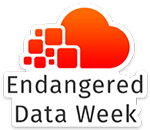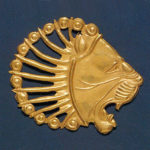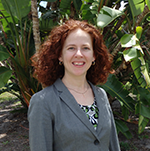
Number 121 • January/February 2018
ISSN 1944-7639 (online version)
Contents
Endangered Data Week Starts Feb. 26
CLIR Appoints Kevin FitzGerald Verner Clapp Distinguished Research Fellow
CLIR Releases Prototype Proof of Concept for Digital Library of the Middle East
E-Research Network Registration Opens in March
Welcome New Staff!
Reminder: Digitizing Hidden Collections Q&A Webinar Feb. 28
Save the Date: 2018 DLF Forum
CLIR Issues is produced in electronic format only. To receive the newsletter electronically, please sign up at https://www.clir.org/pubs/issues/signup. Content is not copyrighted and can be freely distributed.
Follow us on Twitter @CLIRNews, @CLIRHC, @CLIRDLF
Endangered Data Week Starts Feb. 26
Some 40 events are planned throughout North America in conjunction with Endangered Data Week Feb. 26–March 2, 2018.
 Endangered Data Week, first held in April 2017, is a collaborative effort coordinated across campuses, nonprofits, libraries, citizen science initiatives, and cultural heritage institutions to shed light on public datasets that are in danger of being deleted, repressed, mishandled, or lost. The project aims to raise awareness of different types of threats to publicly available data; engage with the power dynamics involved in data creation, sharing, and retention; foster concrete skills and collaborative projects; and highlight work to make endangered data more secure and accessible.
Endangered Data Week, first held in April 2017, is a collaborative effort coordinated across campuses, nonprofits, libraries, citizen science initiatives, and cultural heritage institutions to shed light on public datasets that are in danger of being deleted, repressed, mishandled, or lost. The project aims to raise awareness of different types of threats to publicly available data; engage with the power dynamics involved in data creation, sharing, and retention; foster concrete skills and collaborative projects; and highlight work to make endangered data more secure and accessible.
The week will kick off with a variety of activities, including a Public Data Stories Campaign on Twitter (#EndangeredData), workshops, presentations, and panel discussions that will continue through Saturday. DLF’s interest group on Government Records Transparency & Accountability will hold an #EndangeredData Week Twitter chat on Feb. 27 at 9 pm ET. A full list of events is available here.
DLF is the organizational home of Endangered Data Week. Among other volunteers, the coordinating team includes Jason A. Heppler, of the University of Nebraska at Omaha; Brandon Locke of Michigan State University; Rachel Mattson, of La MaMa Experimental Theatre Club and founder of the DLF interest group in Government Records Transparency & Accountability; and Sarah Melton, of Boston College Libraries. This team was selected to join Mozilla’s 2018 Open Leaders program, which recognizes individuals who “fuel the Internet Health movement by engaging more contributors in their work and connecting with other leaders in the Mozilla community.”
CLIR Appoints Kevin FitzGerald Verner Clapp Distinguished Research Fellow
CLIR has named Kevin FitzGerald as Verner Clapp Distinguished Research Fellow. In this role, FitzGerald will conduct research on making the cycle of academic knowledge—its creation, discovery, publication, accessibility, preservation, and reuse—more cost effective and coherently managed, while facilitating greater scholarly productivity and learning capacity.
 As fellow, FitzGerald will have two primary areas of research. First, he will document and analyze current and emerging digital projects that promote a federated, sustainable, global knowledge environment to preserve and make accessible data and artifacts representative of our cultural heritage. Second, he will oversee research on business models for the long-term sustainability and scaling of this global digital knowledge environment, including initial costs and eventual return on investments. In addition, FitzGerald will solicit institutional and corporate interest in the project.
As fellow, FitzGerald will have two primary areas of research. First, he will document and analyze current and emerging digital projects that promote a federated, sustainable, global knowledge environment to preserve and make accessible data and artifacts representative of our cultural heritage. Second, he will oversee research on business models for the long-term sustainability and scaling of this global digital knowledge environment, including initial costs and eventual return on investments. In addition, FitzGerald will solicit institutional and corporate interest in the project.
The Verner Clapp Distinguished Research Fellowship is named after the first president of CLIR’s predecessor organization, the Council on Library Resources. Clapp was passionate about collaboration and facilitating stronger alignment at a national scale of library and university interests to mitigate resource redundancy, costly duplication, and the prevailing fragmentation of U.S. institutions of higher education.
FitzGerald has been actively involved in CLIR’s efforts to promote the wide adoption and sustainability of Coherence at Scale efforts. He recently retired from the University of North Carolina system, where he served as senior vice president and chief of staff. Previously he served as vice dean for finance and administration and chief of staff at the University of North Carolina School of Medicine. An adjunct faculty member at the University of North Carolina School of Government, he was the founding director of the Center for Public Technology. He has also held senior public executive positions with the state of North Carolina and Forsyth County Government. FitzGerald has an MPA from the University of North Carolina at Chapel Hill and baccalaureate degrees in religious studies from the College of the Holy Cross and canon law from Saint Paul University.
CLIR Releases Prototype Proof of Concept for Digital Library of the Middle East
CLIR has released a prototype proof of concept for the Digital Library of the Middle East (DLME). The prototype was developed in partnership with the Antiquities Coalition, Qatar National Library, and Stanford Libraries, and in service to and collaboration with institutional and individual collaborators throughout the Middle East and Northern Africa (MENA) region.

Created with funding from the Whiting Foundation, the current prototype includes some 135,000 objects. The DLME will ultimately encompass text, video, photographs, archives, manuscripts, 3-D data, and maps illuminating the region’s history over 12 millennia, curated by scholars, specialists, and members of the living and vital cultures it represents. The platform, developed by Stanford Libraries, allows for the display of information in Romanized or Arabic forms.
DLME partners include cultural heritage organizations worldwide who aim to contribute to a globally available resource that provides detailed descriptions and images of artifacts, along with culturally nuanced information about the objects’ history and provenance. Scholars in Cairo, school-children in California and Ankara, travelers from Buenos Aires, and customs agents fighting artifact trafficking in Singapore, among others, will benefit from access to the DLME.
In conjunction with the launch, sample exhibits and case studies are being curated for the website, at https://dlme.clir.org/. Initial exhibits focus on Egyptian and Near Eastern female figurines, Qatar’s maritime history and heritage, and on how the DLME supports cultural heritage preservation. The case study recounts Egyptologist Jacco Dieleman’s discovery, made using the prototype, of papyrus fragments that had not been indexed in other papyrological resources, and illustrates the kind of discovery that the DLME hopes to reveal for users around the world.
DLF E-Research Network Registration Opens in March
DLF’s eResearch Network (eRN), a six-month program that brings together teams from research-supporting libraries to strengthen and advance their local data management and digital scholarship services, will open enrollment March 19.
From May through October, faculty members Jason Clark and Sara Mannheimer will lead participants through a series of monthly webinars, practical assignments, and cohort discussions that will help each team build skills and programs at their institutions. Teams will also have the opportunity for an individualized consultation, where they will produce strategic agendas and working items. At the end of the program, participants are invited to an optional informal networking meetup at the DLF Forum. Program alumni are invited to participate by listening in on guest speaker sessions and joining discussions with the community on Slack.
More information is available at https://www.diglib.org/opportunities/e-research-network/. Submit this form to receive updates about the syllabus and enrollment as they become available.
DLF member institutions receive a tuition discount, but membership is not required to participate.
Welcome New Staff!
We welcome new staff members Joy Banks and Aliya Reich.
 As interim grants officer, Banks works with other members of CLIR’s grants team to manage communications, outreach, social media, and assessment activities for the Recordings at Risk and Digitizing Hidden Special Collections and Archives programs. She served as project coordinator for the 2017 Strategies for Advancing Hidden Collections webinar series. Prior to that, she served as the librarian at Bok Tower Gardens, where she submitted a successful application for the 2013 Cataloging Hidden Special Collections and Archives initiative based at Bok Tower Gardens. She earned her MSLS from Clarion University of Pennsylvania and her Bachelor of Arts in English from Florida Southern College.
As interim grants officer, Banks works with other members of CLIR’s grants team to manage communications, outreach, social media, and assessment activities for the Recordings at Risk and Digitizing Hidden Special Collections and Archives programs. She served as project coordinator for the 2017 Strategies for Advancing Hidden Collections webinar series. Prior to that, she served as the librarian at Bok Tower Gardens, where she submitted a successful application for the 2013 Cataloging Hidden Special Collections and Archives initiative based at Bok Tower Gardens. She earned her MSLS from Clarion University of Pennsylvania and her Bachelor of Arts in English from Florida Southern College.
 Reich joins us as DLF program assistant, with primary responsibility for helping to plan the DLF Forum and other events. She has extensive experience managing public programs in museums, and has worked for Historic Annapolis, the National Building Museum, Walters Art Museum, and the Phillips Collection. She holds a master’s degree in art history from Washington University in St. Louis, and a bachelor’s degree in art history and French from the University of Virginia.
Reich joins us as DLF program assistant, with primary responsibility for helping to plan the DLF Forum and other events. She has extensive experience managing public programs in museums, and has worked for Historic Annapolis, the National Building Museum, Walters Art Museum, and the Phillips Collection. She holds a master’s degree in art history from Washington University in St. Louis, and a bachelor’s degree in art history and French from the University of Virginia.
Reminder: Digitizing Hidden Collections Q&A Webinar Feb. 28
Planning to submit a proposal for a Digitizing Hidden Collections and Archives grant? Join us for a Q&A webinar on Wednesday, Feb. 28 at 2 pm ET. Space is available on a first come, first served basis and no registration is required. The session URL, https://clir.adobeconnect.com/_a960001693/dighc2018qa/, will be open to visitors at about 1:45 pm ET. The webinar will be recorded and posted at https://www.clir.org/hiddencollections/applicant-resources/, along with recordings of previous informational webinars.
Save the Date: 2018 DLF Forum
Mark your calendars! The 2018 DLF Forum will be held Oct. 15–17 in Las Vegas. Registration will open in early summer. Preceding the Forum, on Oct. 14, will be the first-ever Learn@DLF, which will be structured as a workshop day for attendees to gain experience with new tools and resources, exchange ideas, and develop and share expertise with fellow community members. NDSA’s Digital Preservation 2018 will follow the Forum, Oct. 17–18.

